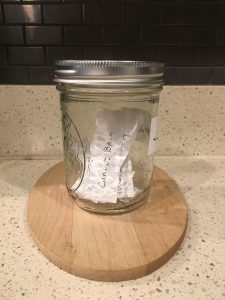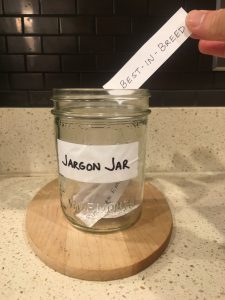
It’s time for the Jargon Jar again! If you’re here for the first time, make sure to read our introductory Jargon Jar post, which explains why this series of posts exists and why you should never purport to be ‘best-in-breed’ in anything. In recent installments, we straightened out circle back and stopped thinking outside the box.
Today, we bring our attention to best-in-breed, an animalistic term that humans in corporate world have kidnapped. We’re here to rescue it.

What does best-in-breed really mean?
Translation: Of the best available quality.
This particular piece of jargon comes from the world of dog shows, also called conformation shows, in which purebred dogs are judged for how well they conform to their established breed type standards. The Westminster Dog Show is the most popular example of this; each year, the winning pup is termed ‘best in show,’ reflecting that they are of the best quality for their respective breed.

At some point, the corporate world co-opted best-in-breed and extended its meaning to strategies, services, and technology in a particular business niche or specialty area. Marketers use the phrase to describe the superiority of their products to alternatives on the market, which has led us to encounter such linguistic gems as:
We offer a best-in-breed solution for optimizing end-to-end technology performance.
Good for you. Sadly, we don’t understand what you’re talking about.
Why is it so bad?
It’s generally a risky bet to term anything you describe as ‘best,’ since such a claim is difficult to substantiate. Thus, best-in-breed or best-of-breed can come off as arrogant descriptors. Best-in-breed adds nothing but confusion to an already superlative claim. Best is powerful in itself—so why include extra words to obscure meaning? Just say best. There’s a reason Muhammad Ali didn’t proclaim, “I am far greater and more successful than my contemporary boxing competition!”
If you’re not talking about your purebred Afghan Hound winning a prestigious dog show, then scrap this one from your lexicon.
We hear best of breed applied to technology solutions and investments, neither of which involve genetic breeding. If you can prove your product is the fastest, most reliable, or most robust one in the market, then find a technically accurate term for describing that value. (More on that in a minute.) Otherwise, prepare for skepticism.
So what should I say instead?
Can you substantiate that your product or service is actually the best? Maybe you can. Maybe your algorithm compresses data twice as fast as the market leader; maybe your financial software can analyze a broader range of statistics than your closest competitor; heck, maybe your latest car emits less energy than anyone other model out there. If so, then tell us why!
For most of us, however, best is a tough sell. Specificity can save us. Focus on attributes where your product performs better than the competition, and use those verbs instead. Examples include: ‘faster than [x competitor],’ ‘more secure than [y competitor],’ or ‘access the largest subscriber base on the web.’ Using third-party certifications, awards, and recognition is a wonderful way to do this as well because it shifts the credibility claim away from you. If your product was recognized by a prestigious body, then your customers will trust that far more than any subjective claim you can make.
Point is: if you can substantiate it, then use specific data to back up your boast. ‘Best’ is a cop-out, at best.
To the jar with you

We bid you adieu, best-in-breed. Enjoy the best company in your new home.
Like this post? Try another
Catch up on past installments of the Jargon Jar by clicking the links below:
Don’t You Dare Leverage This: Welcome to the Jargon Jar
Push the Envelope, then Seal It Away
Let’s Touch Base Offline, then Never Do It Again
Bandwidth: Do You Have Enough, Human?
Circle Back on This Later, Then Stop Circling
We make regular donations to the Jar in this recurring Bottle Talk series. We want your thoughts! Which words and phrases drive you crazy? What’s the worst jargon you heard this week? Leave us a comment below, and help us fill the jar.
